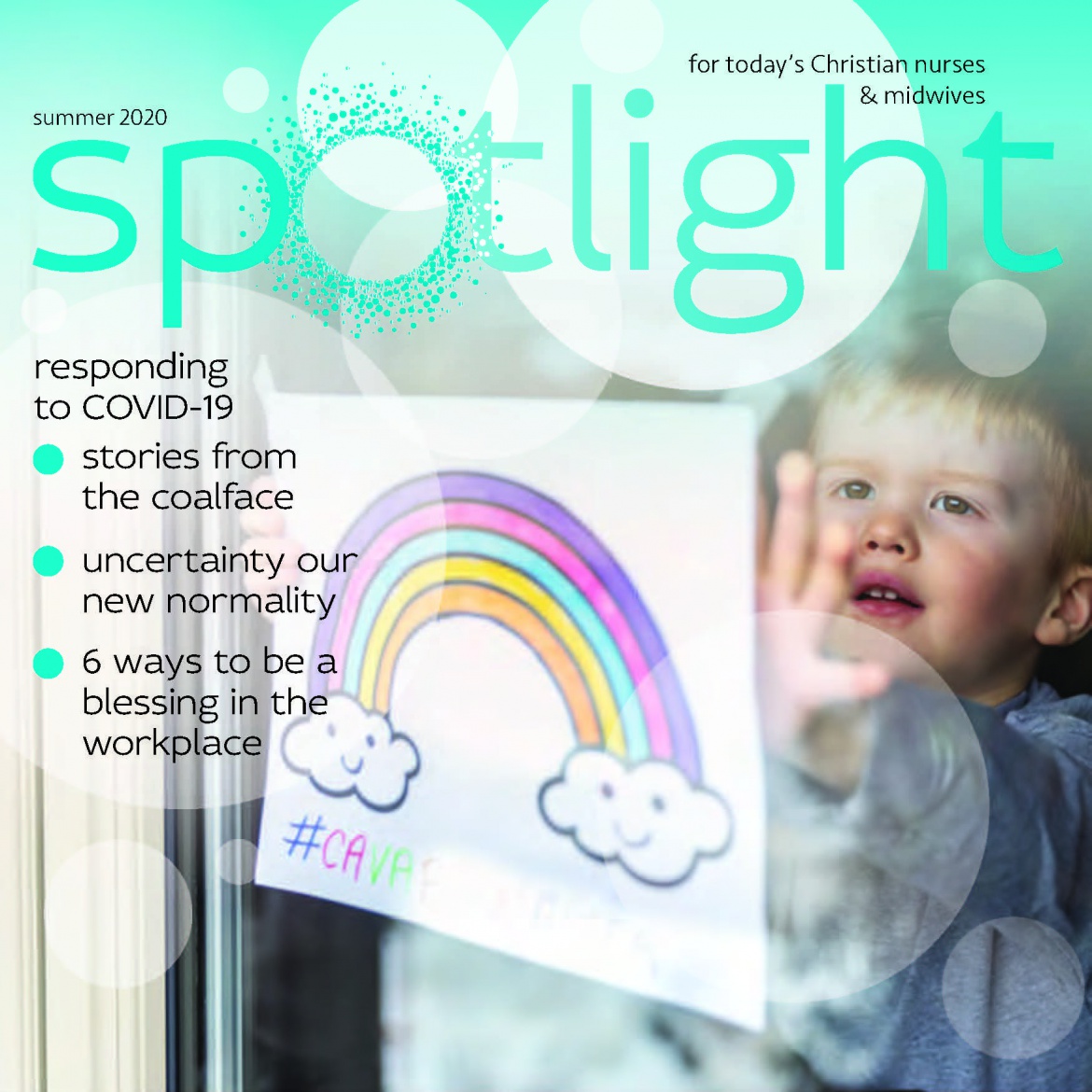The Royal College of Nursing is known for this quote: 'This is where inspiration is met by frustration and where courage must outweigh fear. This is a profession where joy and sadness come in equal measure. This is challenging. This is rewarding. This is nursing.'That summary rings even more true during this extraordinary time of working in healthcare during the coronavirus pandemic. Whilst the world is in shutdown and under strict instruction to stay at home, we continue to go into work and serve on the 'frontline'. It is both a great privilege, as well as a daunting responsibility, to care for and treat the infected and the anxious; to don and doff the PPE, and work in flexible ways in unfamiliar settings.
As nurses, our call is to put the needs of the people in our care first; to serve them and work as a team for their good. You could say our call is to 'bless people'.
As Christians, we know blessing personally. We know that Christ is the ultimate, sacrificial, servant king, who humbled himself, dirtied himself and emptied himself for us. He has eternally healed us and truly blessed us with salvation, and life in its fullness. We have a treasure and a hope to share, a source of true blessing. As Christian nurses and midwives, we are blessed to be a blessing!
Humanly, it certainly is an overwhelming time. We are reliant on God to speak and to act through our feeble words and actions.
Here are some ways we can ask God to help us to be a blessing in the healthcare workplace at this time.
However, be aware of the effect of escalating anxieties in certain groups, and consider whether it may be right to speak to lift people's eyes up and out of a pit of spiralling fear.
Focus on truth: what we know and what don't we know. What we can do and what we can't do.
A calming voice can have a considerable impact. Acknowledge your colleagues' feelings of anxiety and validate their emotional experience. Remember, you don't have to agree with someone's feelings or choices to acknowledge their emotions are valid.
Show that you recognise their concerns and have listened to them by gently repeating their words back to them.
In your own speech, focus on the positive things, and affirm that you are working together as a team to protect each other and your patients at this time.
Despite the increased physical distance, as some members are redeployed whilst others are at home self-isolating, there are still many opportunities to deepen relationships with colleagues.
Make use of the technology: use WhatsApp groups, call one another or even try group Zoom video calls. Check-in with colleagues regularly and hear how they are finding the situation, especially those who are quieter on the group chat. Encourage one another after good and bad shifts; tell your colleagues how much you appreciate them.
Remind each other what a privilege it is to be a healthcare professional, especially at this time (and listen out for the Clap for Carers!).
As healthcare professionals, we are blessed to have a skill-set which is SO valued right now; many at home will be feeling restless, without a hands-on, helping job.
Remind each other of the joy it is to care for people as a profession and why you went into this field of work in the first place!
For those who are hospitalised but don't yet have symptoms, there is often an acute (and justified) fear of contracting the virus whilst an inpatient.
Furthermore, the increased use of PPE, even for non-infected patients, exacerbates these fears and can be an additional barrier to good communication between patient and practitioner.
For those who are Covid-positive, the healthcare professionals caring for them are dressed head to toe in gowns, masks, gloves and visors. This visual reminder that they are 'untouchable', may reinforce their feelings of fear about being infected with a contagious virus and the seriousness of the state they are in.
Take any opportunity you can to show that behind all the PPE you are genuinely concerned and care for those you are looking after.
Anxiety will impact one's physical, mental, emotional and spiritual health. So, remember a holistic approach to care and, especially as a Christian, may you be Christ's hands, feet, ears and voice.
If their loved one has tested positive or is having ventilator support, they will undoubtedly be scared and assume the worse; likely more so as they are unable to visit and talk directly with practitioners. You must give your patients' relatives extra time on the phone. As with patients and colleagues, listen to their concerns; validate emotions, but seek to diffuse unqualified anxiety with the truth of the situation; give clear explanations and frequent updates avoiding using medical jargon.
Put yourself in their shoes; practice empathy, show that you have the ability to share and understand their feelings.
Give reassurance that you and your team are doing all you can to provide the treatment their relative needs and support their wellbeing. Have the courage to be honest if their loved one is deteriorating. If, and when, difficult conversations around end of life arise, emphasise that your priority will be to ensure the comfort and dignity in the final stages.
I am drawn to Psalm 62:1-2 which says Truly my soul finds rest in God;my salvation comes from him.Truly he is my rock and my salvation;he is my fortress, I will never be shaken.
When faced with life and death in this acute way, big questions about the meaning of life arise. We are reminded that without God we cannot provide true hope, peace or assurance.
I urge you to take this season to pray for opportunities to share the hope you have far and wide. Be sensitive to opportunities arising for deeper conversations with your patients, their relatives and your colleagues.
Ask about your patient's spiritual health. Be open about what gives you hope in this uncertain time and perhaps why you are less anxious, even when going into a corona-positive ward. You don't need to be controlled by fear, because your foundation is not built on yourself and your health. Our hope is built on our assurance of union with God, made possible through Jesus' sacrifice and righteousness.
Take the opportunity of the world being online to share hope. Invite people to church online, share videos and provoke conversations about Christ. He is our saviour, sustainer and source of strength.
To be a blessing in the workplace, you must draw from him and realign your heart to his. Take every opportunity throughout your working day to pray. Pray that you know God's strength and thank him for sustaining you. Pray for your patients and colleagues and for words to give them.
This is also a great time to connect with Christians in your workplace, to encourage one another to be lights for Christ.
As we care for people who may feel dirty and contagious, let's remind each other that our ultimate example of care is the sacrificial love of Jesus, who felt compassion towards us as we suffer with the disease of sin. There is nothing that we have done, or could do, to deserve his love. Yet, because of his love for us, he gave his life as a sacrifice so that we might have a right relationship with God and know the joy and hope of the Lord.
Let us then, in turn, love our patients and serve them with joy.
Esther Chevassut is a staff nurse in a High Dependency Unit and a CMF Associate Staff Worker for nurses and midwives
As nurses, our call is to put the needs of the people in our care first; to serve them and work as a team for their good. You could say our call is to 'bless people'.
As Christians, we know blessing personally. We know that Christ is the ultimate, sacrificial, servant king, who humbled himself, dirtied himself and emptied himself for us. He has eternally healed us and truly blessed us with salvation, and life in its fullness. We have a treasure and a hope to share, a source of true blessing. As Christian nurses and midwives, we are blessed to be a blessing!
Humanly, it certainly is an overwhelming time. We are reliant on God to speak and to act through our feeble words and actions.
Here are some ways we can ask God to help us to be a blessing in the healthcare workplace at this time.
1 listen to people's concerns whilst being sensitive about when to diffuse unwarranted fear and anxiety
Whether it's frustration over PPE, the fear of catching the virus or family at home catching it, fear of the future, low staffing, overwhelming work, etc. Listen to people and their concerns.However, be aware of the effect of escalating anxieties in certain groups, and consider whether it may be right to speak to lift people's eyes up and out of a pit of spiralling fear.
Focus on truth: what we know and what don't we know. What we can do and what we can't do.
A calming voice can have a considerable impact. Acknowledge your colleagues' feelings of anxiety and validate their emotional experience. Remember, you don't have to agree with someone's feelings or choices to acknowledge their emotions are valid.
Show that you recognise their concerns and have listened to them by gently repeating their words back to them.
In your own speech, focus on the positive things, and affirm that you are working together as a team to protect each other and your patients at this time.
2 encourage your colleagues, in person or online
Paradoxically, during this time of social-distancing, you may have experienced social - deepening; people are drawn closer to one another in time of crisis. This could include your work team!Despite the increased physical distance, as some members are redeployed whilst others are at home self-isolating, there are still many opportunities to deepen relationships with colleagues.
Make use of the technology: use WhatsApp groups, call one another or even try group Zoom video calls. Check-in with colleagues regularly and hear how they are finding the situation, especially those who are quieter on the group chat. Encourage one another after good and bad shifts; tell your colleagues how much you appreciate them.
Remind each other what a privilege it is to be a healthcare professional, especially at this time (and listen out for the Clap for Carers!).
As healthcare professionals, we are blessed to have a skill-set which is SO valued right now; many at home will be feeling restless, without a hands-on, helping job.
Remind each other of the joy it is to care for people as a profession and why you went into this field of work in the first place!
3 meet patients' anxiety with peace
Understandably, patients are likely to be more anxious than usual, especially if they have tested positive for coronavirus. Even more so if they require oxygen or ventilator support. With the death toll rising daily, many are understandably terrified by COVID-19.For those who are hospitalised but don't yet have symptoms, there is often an acute (and justified) fear of contracting the virus whilst an inpatient.
Furthermore, the increased use of PPE, even for non-infected patients, exacerbates these fears and can be an additional barrier to good communication between patient and practitioner.
For those who are Covid-positive, the healthcare professionals caring for them are dressed head to toe in gowns, masks, gloves and visors. This visual reminder that they are 'untouchable', may reinforce their feelings of fear about being infected with a contagious virus and the seriousness of the state they are in.
Take any opportunity you can to show that behind all the PPE you are genuinely concerned and care for those you are looking after.
- Pause and listen to them.
- Explain the meaning of the words you are using.
- Explain that you're doing all you can and you will strive for their comfort and wellbeing.
Anxiety will impact one's physical, mental, emotional and spiritual health. So, remember a holistic approach to care and, especially as a Christian, may you be Christ's hands, feet, ears and voice.
4 give relatives more time on the phone
Currently, there is great anxiety around being admitted to hospital, and when admission does occur, relatives find themselves in the challenging situation of being unable to visit their loved one.If their loved one has tested positive or is having ventilator support, they will undoubtedly be scared and assume the worse; likely more so as they are unable to visit and talk directly with practitioners. You must give your patients' relatives extra time on the phone. As with patients and colleagues, listen to their concerns; validate emotions, but seek to diffuse unqualified anxiety with the truth of the situation; give clear explanations and frequent updates avoiding using medical jargon.
Put yourself in their shoes; practice empathy, show that you have the ability to share and understand their feelings.
Give reassurance that you and your team are doing all you can to provide the treatment their relative needs and support their wellbeing. Have the courage to be honest if their loved one is deteriorating. If, and when, difficult conversations around end of life arise, emphasise that your priority will be to ensure the comfort and dignity in the final stages.
5 share hope
What COVID-19 is bringing home, for many perhaps more soberly than ever before, is that we as humans are not in control. Much of what we naturally hold dearly, or have taken for granted, has been taken away from us or is crumbling before our eyes: businesses, economical security, comfort, community, health, certainty. This stirs the world to ask 'What is my foundation?' 'Where have I put my hope?' 'What does this all mean?'I am drawn to Psalm 62:1-2 which says Truly my soul finds rest in God;my salvation comes from him.Truly he is my rock and my salvation;he is my fortress, I will never be shaken.
When faced with life and death in this acute way, big questions about the meaning of life arise. We are reminded that without God we cannot provide true hope, peace or assurance.
I urge you to take this season to pray for opportunities to share the hope you have far and wide. Be sensitive to opportunities arising for deeper conversations with your patients, their relatives and your colleagues.
Ask about your patient's spiritual health. Be open about what gives you hope in this uncertain time and perhaps why you are less anxious, even when going into a corona-positive ward. You don't need to be controlled by fear, because your foundation is not built on yourself and your health. Our hope is built on our assurance of union with God, made possible through Jesus' sacrifice and righteousness.
Take the opportunity of the world being online to share hope. Invite people to church online, share videos and provoke conversations about Christ. He is our saviour, sustainer and source of strength.
6 prioritise time with God each day and encourage Christians in your workplace
There's a strange abundance of time coupled with a lack of structure in our days at the moment. This can be both freeing as well as overwhelming. Before consuming the endless updates on every media platform on your phone and laptop, don't waste the gift of time and fall back into regular habits. Instead, spend time with your heavenly Father, basking in him. Take time to dwell in his Word, talking and listening to him in prayer, and worshipping him in sung praise.To be a blessing in the workplace, you must draw from him and realign your heart to his. Take every opportunity throughout your working day to pray. Pray that you know God's strength and thank him for sustaining you. Pray for your patients and colleagues and for words to give them.
This is also a great time to connect with Christians in your workplace, to encourage one another to be lights for Christ.
As we care for people who may feel dirty and contagious, let's remind each other that our ultimate example of care is the sacrificial love of Jesus, who felt compassion towards us as we suffer with the disease of sin. There is nothing that we have done, or could do, to deserve his love. Yet, because of his love for us, he gave his life as a sacrifice so that we might have a right relationship with God and know the joy and hope of the Lord.
Let us then, in turn, love our patients and serve them with joy.
Esther Chevassut is a staff nurse in a High Dependency Unit and a CMF Associate Staff Worker for nurses and midwives
































